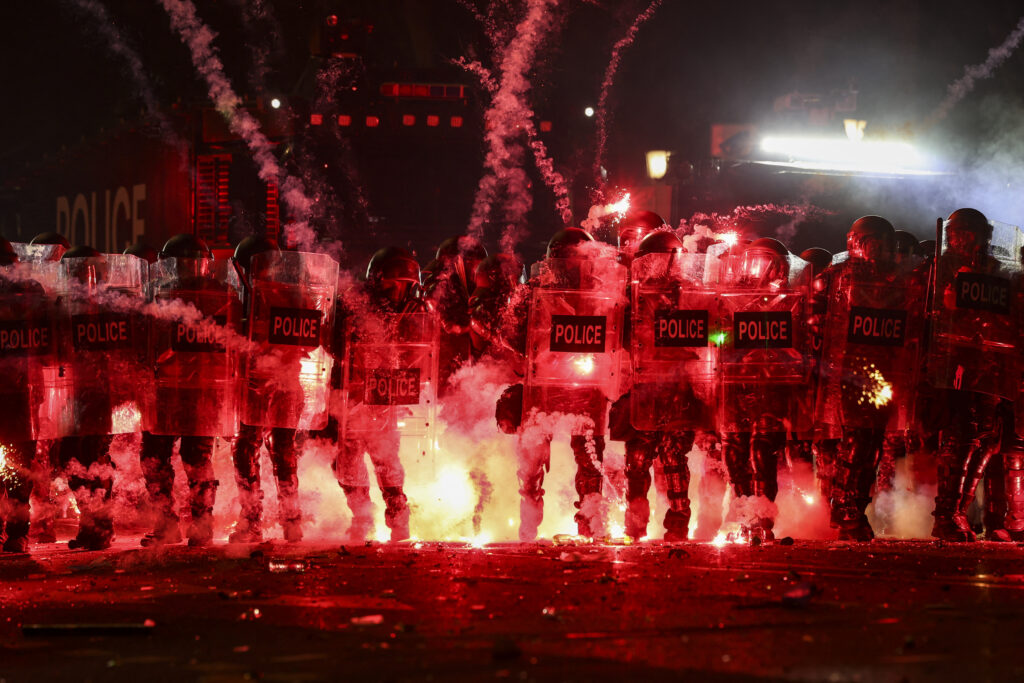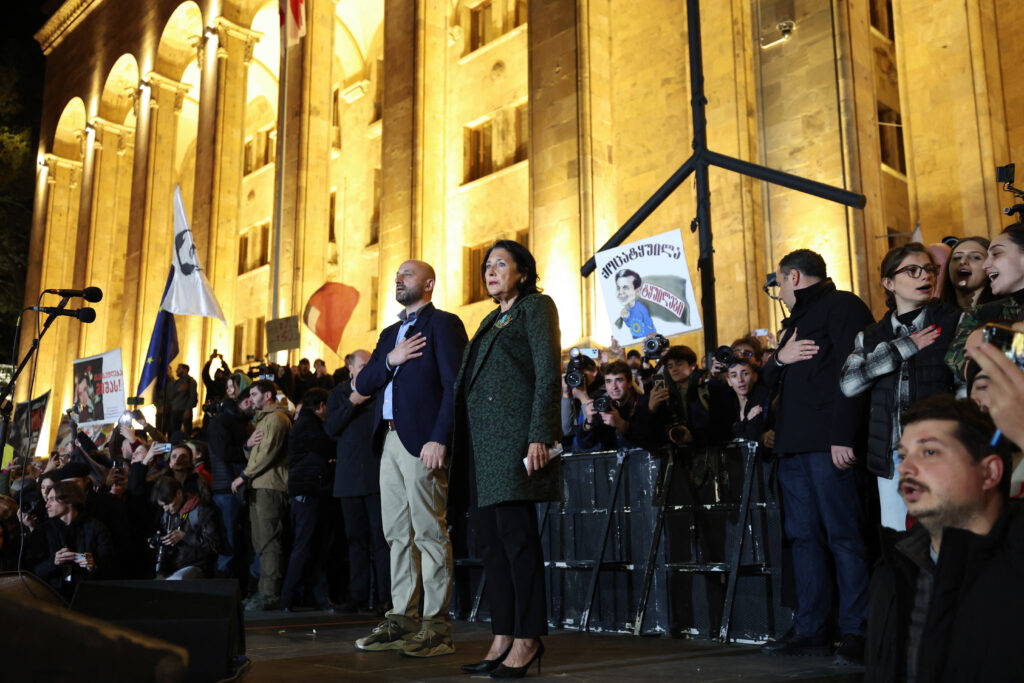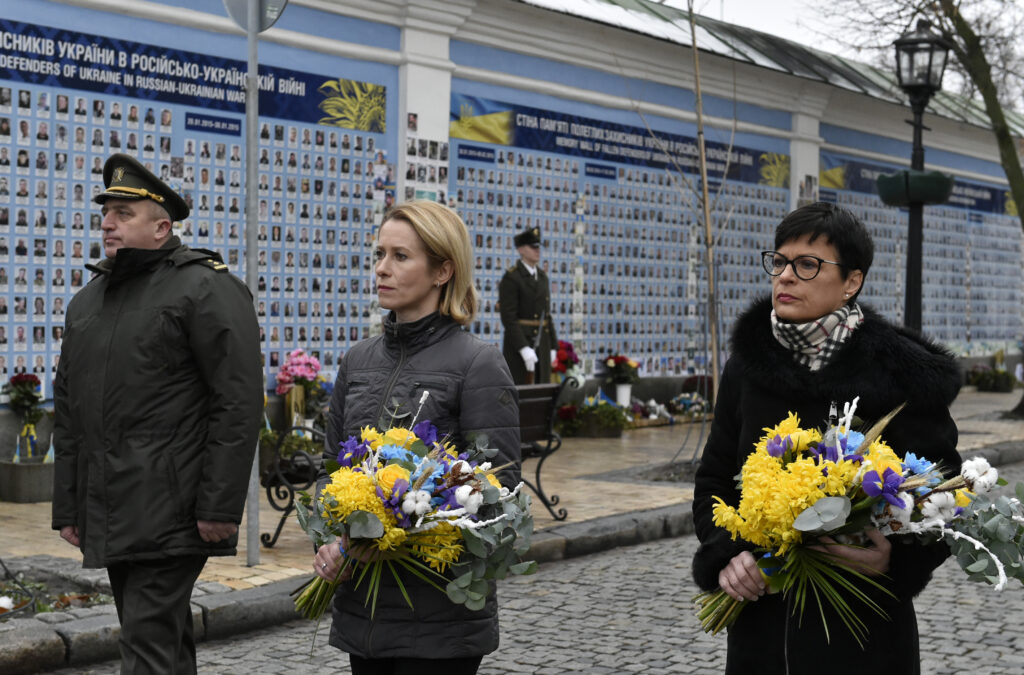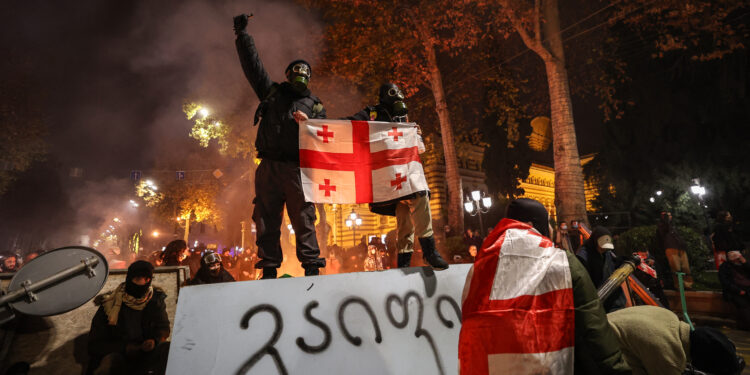Brussels – Georgia increasingly looks like a powder keg ready to explode. Violent protests against the pro-Russian government have been going on for four days, with dozens of injured people hospitalised among both protesters and police (who are forcibly suppressing dissent), and with the disruptions now extending to several cities beyond the capital, Tbilisi. The escalating clash in the streets is also compounded by a hard clash at the political and institutional levels, which threatens to paralyse (or further destabilise) the small Caucasian country, which is increasingly caught between Europe and Russia.
The protests do not subside
Beginning on Thursday night (Nov. 28), thousands of citizens occupied Rustaveli Avenue, the artery in Tbilisi where the national parliament is located, for four days. The straw that broke the camel’s back was the announcement by the government, led by Prime Minister Irakli Kobakhidze and his Georgian Dream party, to suspend until 2028 negotiations for EU membership (a goal enshrined in the Constitution).
The executive cited as justification the “blackmail” by Brussels—which froze this summer Tbilisi’s path to the twelve-star club following the approval of a series of measures it considers liberticidal and antithetical to European values—against Georgia, which, according to Kobakhidze, will continue on the path of rapprochement to the Union “with dignity” without compromising its sovereignty. Georgians have challenged this decision as yet another demonstration that the ruling party is trying to bring Tbilisi closer to Vladimir Putin‘s Russia and distance it from Europe.

So, they took to the streets with national and EU flags: for four days, they erected barricades and engaged in actual urban guerrilla warfare, shooting fireworks at security forces who, in riot gear, responded by violently charging protesters and employing rubber bullets at eye level, stun grenades, pepper spray, and water cannons to disperse them. Some images capture protesters setting fire to effigies of Bidzina Ivanishvili, the pro-Russian oligarch founder of the Georgian Dream and eminence grise of the Caucasian nation.
Over the weekend, the protests, instead of subsiding, intensified and spread to several other cities across the country. According to figures circulated in the early hours of today (Dec. 2), at least 44 people have reportedly ended up in the hospital, including 27 protesters, 16 policemen and a journalist, while arrests are already reportedly over 100.
The institutional clash worsens
The wave of protests has been shaking the country at least since Oct. 27, in the aftermath of controversial elections that saw Georgian Dream triumph for the fourth time in a row and which parliamentary oppositions (and election observers) denounced as irregular, calling for their rerun under international monitoring.
However, the chaos in Georgia is not only in the streets. Even the highest echelons of the state are moving toward a wall-to-wall with unpredictable and potentially risky outcomes. After attending the street protests in person last Saturday (Nov. 30), the pro-European President Salomé Zourabichvili declared that “there is no legitimate parliament and, therefore, an illegitimate parliament cannot elect a new president,” adding that “no inauguration can take place and my term will continue until a legitimately elected parliament is formed.”

Zourabichvili, whose term expires next Dec. 14, has many times refused to recognise the powers of the new hemicycle by calling it “unconstitutional”, while opposition MPs are boycotting it by avoiding occupying their seats in the House. But government forces equally have the numbers to install the new legislature and have initiated the work of the new assembly, naming furthermore their own candidate to succeed Zourabichvili in the figure of former soccer player Mikheil Kavelashvili.
If the parties do not compromise—and it is difficult at the moment to see how they can—the risk is that the head-on institutional clash could degenerate into a more concrete conflict to capture or maintain political power in a country whose democratic structures are increasingly creaking and the social fabric seems close to a breaking point. Throwing further gasoline on the fire, Kobakhidze reported that Georgian intelligence and security services were reportedly reporting attempts to “overthrow the government by force” by “specific political parties” without going into the details of these serious allegations.
In the meantime, in the last few hours, there have been a series of resignations in the Georgian state apparatus among ambassadors, civil servants (including those in various ministries and the central bank), and teachers in opposition to the decision to break off the dialogue with Brussels.
Reactions from abroad
Developments in Georgia continue to remain under the attention of key international actors. On behalf of the EU, High Representative Kaja Kallas and Enlargement Commissioner Marta Kos (both of whom took office on December 1) have declared in a joint note that the suspension of accession negotiations “marks a departure from the policies of all previous Georgian governments and the aspirations of the vast majority of the Georgian people.” As for the excessive violence against the protesters, Brussels warns Tbilisi that “these actions by the Georgian government will have direct consequences” on bilateral relations with the EU, which remains to await the final report of the OSCE on the conduct of the October 26 elections (elections that the Strasbourg-based EU Parliament asked to rerun).

On the other side of the Atlantic, the United States announced the suspension of the Strategic Partnership initiated with the Caucasian country in 2009, a mechanism for bilateral cooperation in areas related to democracy, defence and security, economics, trade and energy, and cultural exchange. Washington’s motives are to be found in the “democratic regression” of the former Soviet republic under Georgian Dream leadership, which “rejected the opportunity for closer ties with Europe and made Georgia more vulnerable to the Kremlin.” Kobakhidze said he was not concerned by the decision of outgoing President Joe Biden and was waiting for Donald Trump to take office in the White House to work fruitfully with the new administration.
The comments coming from Moscow, on the other hand, are of the opposite tenor, with a finger pointed by Security Council number two Dmitry Medvedev against alleged foreign interference in Georgian domestic affairs, aimed in his view at aiming at an anti-Russian revolution. According to the former president of the Federation, Tbilisi would be “moving rapidly along the Ukrainian path, to the dark abyss,” in a not-too-veiled reference to the crisis that began in Kyiv with the Euromaidan protests and precipitated with the Russian invasion in February 2022. “Usually, this kind of thing ends very badly,” he added ominously.
English version by the Translation Service of Withub








